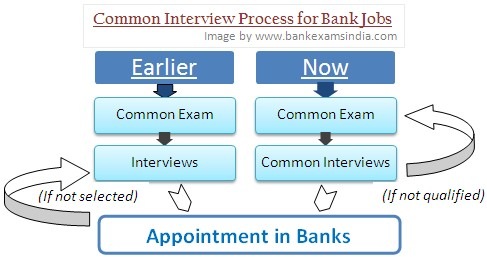Banking sector has been the forerunner in generating jobs for the past few years.The trend is expected to continue for next few years considering the amount of retirements in public sector banks.The Indian government seems to have sensed this & decided to overhaul the bank recruitments.Read on to find out how it matters.
The present generation of graduates are more interested in choosing safe & secured careers over high paying jobs in private companies.
It is evident from the numbers released occasionally.Over 7 lakh people appeared for the latest IBPS common written exams & approx. 36 lakh applied for 11000 clerk jobs in SBI few years back.
Birth of Common Interviews
Ever since multiple selections cropped up in PO recruitments frustrated candidates started to vent their anger on banks across various online forums. Infact most were in favour of a single interview system similar to the common exams.
The banks were also facing dropouts from their final selection lists since many were chosen in 2 or 3 other banks.
After top level discussions, the Govt. of India finally approved the proposal to conduct common interviews for bank jobs which could start off with the 2012 PO exam passouts.
Just 1 Chance
Many heaved a sigh of relief on hearing this announcement hoping to see multiple selections end. Yes it may, along with other benefits such as lower fees & decrease in time taken by banks to complete hiring.
But there shall be only one chance for all aspirants to get through the exam & interview. If you fail to qualify in any one – you are out & have to register for the next IBPS exam after 6 months (common exams for probationary officer & clerk posts are held twice a year)

Earlier each public bank conducted written test & personal interviews separately. So even if a person couldn’t`t qualify in 1 bank there was always an option to apply for another bank & go through the same processes.
With the introduction of common procedures, there is no opportunity for failed applicants to improve and reappear again immediately.
This would particularly put more pressure on those attaining the maximum age to try and get through at one shot.
Toppers Get In
Normally IBPS fixes cutoffs keeping in mind the number of vacancies making sure there are enough people to choose from.
Let’s assume 15000 vacancies exist this year.60000 people have cleared the tests. From this huge pool, only the top 15000 scorers (exam + common interview) will get appointments.The remaining 45000 have to just wait for the next IBPS CWE.
Hence passing the common test or interviews alone does not guarantee a job in banks.It all depends on the final scores & your ranking against fellow competitors.
In simple words – higher your scores, better are your chances for making it to the final lists.
Banks anyhow are well placed since they would be able to pick the best available talent & fill their vacancies at shortest possible time.
Action Awaits
The rules for common interviews are yet to be announced & when its made public things shall become clear (see can common interviews solve selection issues)
But without any doubt – selections for upcoming bank jobs are set to become more competitive and tougher for job seekers.
So those candidates who were not able to clear or have low marks in CWE need to put in more hardwork during preparations for posting high scores rather than just passing.

